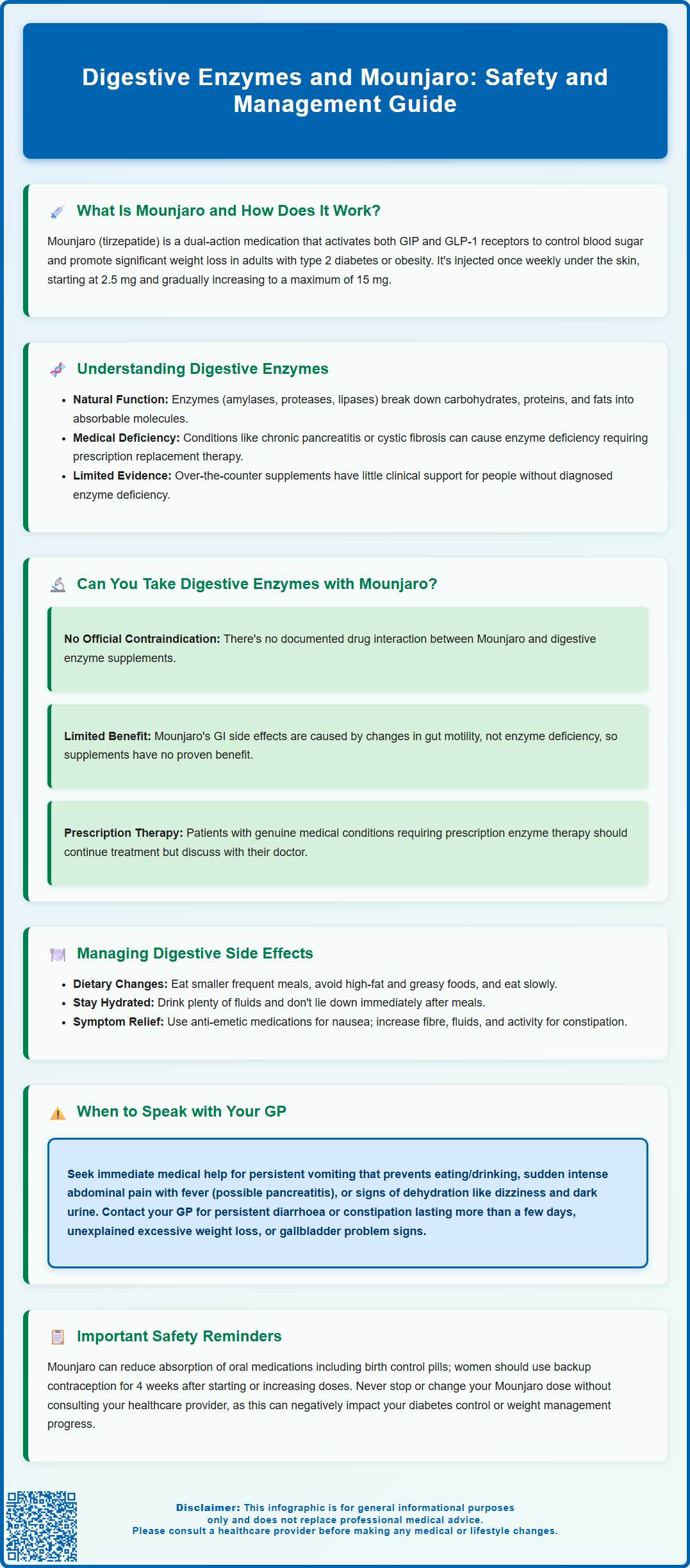Mounjaro (tirzepatide) is a dual GIP and GLP-1 receptor agonist licensed in the UK for type 2 diabetes and weight management. As with many GLP-1-based therapies, gastrointestinal side effects such as nausea, bloating, and altered digestion are common, leading some patients to consider digestive enzyme supplements. Whilst there is no formal contraindication to combining digestive enzymes and Mounjaro, understanding the mechanisms of both, the evidence base, and when supplementation is genuinely indicated is essential. This article explores the interaction between Mounjaro and digestive enzymes, practical management of digestive symptoms, and when to seek medical advice.
Summary: There is no formal contraindication to taking digestive enzymes with Mounjaro, but there is limited evidence that enzyme supplements alleviate Mounjaro-related gastrointestinal side effects.
- Mounjaro (tirzepatide) is a dual GIP and GLP-1 receptor agonist licensed for type 2 diabetes and weight management in the UK.
- The medication delays gastric emptying, which promotes satiety but commonly causes nausea, bloating, and altered digestion during dose titration.
- Digestive enzyme supplements are not contraindicated with Mounjaro, but lack robust evidence for managing drug-related gastrointestinal symptoms.
- Prescription pancreatic enzyme replacement therapy (PERT) is appropriate for patients with confirmed exocrine pancreatic insufficiency and should be continued under medical supervision.
- Severe or persistent abdominal pain, vomiting, or signs of pancreatitis require urgent medical assessment whilst taking Mounjaro.
Table of Contents
What Is Mounjaro and How Does It Work?
Mounjaro (tirzepatide) is a prescription medicine licensed in the UK for the treatment of type 2 diabetes mellitus. It is also licensed for weight management in adults with obesity (BMI ≥30 kg/m²) or overweight (BMI ≥27 kg/m²) with at least one weight-related comorbidity. It belongs to a novel class of medications known as dual glucose-dependent insulinotropic polypeptide (GIP) and glucagon-like peptide-1 (GLP-1) receptor agonists. This dual mechanism distinguishes Mounjaro from other GLP-1 receptor agonists currently available.
The medicine works by mimicking the action of two naturally occurring incretin hormones in the body. GLP-1 stimulates insulin secretion when blood glucose levels are elevated, suppresses glucagon release (which reduces glucose production by the liver), slows gastric emptying, and promotes satiety through central appetite regulation. GIP also enhances insulin secretion and may influence fat metabolism and energy balance. Clinical trials have shown that by activating both pathways simultaneously, tirzepatide provides effective glycaemic control and significant weight reduction.
Mounjaro is administered once weekly via subcutaneous injection, typically in the abdomen, thigh, or upper arm. The dose is gradually increased over several weeks to minimise gastrointestinal side effects, starting at 2.5 mg and potentially escalating to a maximum maintenance dose of 15 mg, with each dose increase occurring after at least 4 weeks if tolerated. The National Institute for Health and Care Excellence (NICE) has issued guidance supporting its use in specific patient populations with type 2 diabetes where other treatments have proven inadequate (TA870). Importantly, the delayed gastric emptying effect of Mounjaro can reduce the absorption of oral contraceptives, so additional contraceptive methods are recommended for 4 weeks after initiation and each dose increase. Patients should always use Mounjaro under the supervision of a healthcare professional experienced in managing diabetes or obesity.

Understanding Digestive Enzymes and Their Role
Digestive enzymes are specialised proteins produced primarily by the pancreas, salivary glands, stomach, and small intestine. Their essential function is to break down macronutrients—carbohydrates, proteins, and fats—into smaller molecules that can be absorbed through the intestinal wall and utilised by the body. The main categories include amylases (which digest carbohydrates), proteases (which break down proteins), and lipases (which digest fats, while bile salts emulsify them).
In healthy individuals, the body produces sufficient quantities of these enzymes to manage normal dietary intake. However, certain medical conditions can impair enzyme production or secretion. Chronic pancreatitis, cystic fibrosis, pancreatic cancer, and coeliac disease are examples of conditions that may lead to exocrine pancreatic insufficiency (EPI), where inadequate enzyme levels result in malabsorption, steatorrhoea (fatty stools), weight loss, and nutritional deficiencies.
Over-the-counter digestive enzyme supplements are widely available and are sometimes used by individuals experiencing bloating, indigestion, or discomfort after meals. These products typically contain a blend of plant-derived or microbial enzymes. It is important to note that there is limited clinical evidence supporting routine use of these supplements in people without diagnosed enzyme deficiency. Prescription pancreatic enzyme replacement therapy (PERT), such as Creon or Pancrex, is specifically indicated for patients with confirmed EPI and is formulated with enteric-coated minimicrospheres to survive the acidic stomach environment, releasing enzymes in the small intestine where they are needed. PERT is typically taken with meals and snacks. Self-prescribing enzyme supplements without medical guidance is not generally recommended, particularly when starting new medications like Mounjaro.
Can You Take Digestive Enzymes with Mounjaro?
There is currently no official contraindication to taking digestive enzyme supplements alongside Mounjaro, and no formal drug interaction has been documented between tirzepatide and pancreatic enzyme replacement therapies or over-the-counter enzyme products in the Mounjaro Summary of Product Characteristics. However, this does not automatically mean that combining them is necessary, beneficial, or without considerations.
Mounjaro's mechanism of action includes delayed gastric emptying, which is one of the ways it promotes satiety and aids weight loss. This slowing of stomach emptying can alter the timing and environment in which food is digested. In theory, taking digestive enzymes may not align optimally with this altered digestive process, though there is no clinical evidence to confirm or refute any meaningful impact. For individuals with a genuine medical need for enzyme replacement—such as those with chronic pancreatitis or EPI—continuing prescribed PERT while on Mounjaro is appropriate and should be discussed with the prescribing clinician.
For those considering over-the-counter enzyme supplements to manage gastrointestinal side effects such as bloating, nausea, or indigestion while taking Mounjaro, it is essential to understand that these symptoms are common during the initial titration phase and often improve with time. There is no robust evidence that enzyme supplements alleviate these specific Mounjaro-related side effects, as they are primarily driven by the drug's effect on gut motility and central appetite pathways rather than enzyme deficiency.
It's important to note that Mounjaro can reduce the absorption of oral medications, including oral contraceptives, due to its effect on gastric emptying. Women using oral contraceptives should consider additional contraceptive methods for 4 weeks after starting Mounjaro or after each dose increase. Additionally, patients taking insulin or sulfonylureas may have an increased risk of hypoglycaemia when starting Mounjaro and may need dose adjustments of these medications. Before adding any supplement, patients should consult their GP or diabetes specialist nurse to ensure it is safe, appropriate, and unlikely to interfere with their treatment plan or mask symptoms that require medical attention.
Managing Digestive Side Effects on Mounjaro
Gastrointestinal side effects are among the most commonly reported adverse reactions to Mounjaro, particularly during dose escalation. These include nausea, vomiting, diarrhoea, constipation, abdominal pain, bloating, and reduced appetite. Most of these effects are mild to moderate in severity and tend to diminish as the body adjusts to the medication over several weeks.
Practical strategies to minimise digestive discomfort include:
-
Eating smaller, more frequent meals rather than large portions, which can overwhelm a slower-emptying stomach.
-
Avoiding high-fat, greasy, or heavily spiced foods, as these can exacerbate nausea and delayed gastric emptying.
-
Staying well hydrated, especially if experiencing vomiting or diarrhoea, to prevent dehydration and reduce the risk of acute kidney injury.
-
Taking time to eat slowly and chewing food thoroughly to aid digestion.
-
Avoiding lying down immediately after eating, which can worsen reflux or nausea.
If nausea is particularly troublesome, some patients find relief through anti-emetic medications as advised by their GP. Some patients anecdotally report benefit from taking the injection in the evening, though this should only be done if consistent with your prescribed regimen. Constipation may respond to increased dietary fibre, adequate fluid intake, and gentle physical activity. Over-the-counter laxatives can be used short-term if needed, but persistent constipation should be discussed with a healthcare professional.
It is important to differentiate between expected, transient side effects and symptoms that may indicate a more serious problem. Severe or persistent vomiting, unrelenting abdominal pain (especially if radiating to the back), or signs of pancreatitis (such as acute upper abdominal pain with nausea) require urgent medical assessment. Be alert for symptoms of gallbladder disease (right upper quadrant pain, fever, jaundice, pale stools or dark urine), which can occur with rapid weight loss. Patients taking insulin or sulfonylureas alongside Mounjaro should be aware of increased hypoglycaemia risk and discuss potential dose adjustments with their healthcare team.
If you experience any suspected side effects from Mounjaro, you can report them to the MHRA through the Yellow Card scheme at yellowcard.mhra.gov.uk or via the Yellow Card app.
When to Speak with Your GP About Digestive Concerns
While mild gastrointestinal symptoms are common and often manageable with lifestyle adjustments, certain situations warrant prompt discussion with your GP, diabetes specialist nurse, or prescribing clinician. You should seek medical advice if you experience:
-
Severe or persistent nausea and vomiting that prevents you from eating, drinking, or taking other medications, as this can lead to dehydration and nutritional deficiencies.
-
Severe abdominal pain, particularly if it is sudden, intense, or accompanied by fever, as this may indicate pancreatitis—a rare but serious side effect associated with GLP-1 receptor agonists.
-
Persistent diarrhoea or constipation lasting more than a few days, or any change in bowel habits that concerns you.
-
Unexplained weight loss beyond what is expected, or signs of malabsorption such as pale, greasy stools that are difficult to flush.
-
Symptoms of dehydration, including dizziness, dark urine, dry mouth, or reduced urination, which could indicate risk of acute kidney injury.
-
Persistent or worsening reflux or upper gastrointestinal symptoms that may be related to delayed gastric emptying.
-
Signs of gallbladder problems such as right upper abdominal pain, fever, yellowing of the skin or eyes, or pale stools with dark urine.
For severe symptoms such as intense abdominal pain, persistent vomiting, signs of dehydration, or suspected pancreatitis, contact NHS 111 or attend urgent care/A&E as appropriate.
If you have a pre-existing pancreatic condition or a history of gastrointestinal disease, it is particularly important to maintain open communication with your healthcare team. Your GP can assess whether symptoms are a normal part of adjusting to Mounjaro, whether dose adjustment is needed, or whether further investigation (such as blood tests, imaging, or referral to gastroenterology) is appropriate.
It's important to note that Mounjaro is not recommended during pregnancy or breastfeeding. Women of childbearing potential should use effective contraception while taking Mounjaro.
Never stop or adjust your Mounjaro dose without medical guidance, as this can affect your diabetes control or weight management progress. Your healthcare team is there to support you in achieving the best possible outcomes while minimising side effects and ensuring your safety throughout treatment.
Frequently Asked Questions
Can I take over-the-counter digestive enzymes whilst on Mounjaro?
There is no formal contraindication, but there is limited evidence that over-the-counter enzyme supplements relieve Mounjaro-related gastrointestinal symptoms. Always consult your GP or diabetes specialist before adding any supplement to ensure it is appropriate for your individual circumstances.
Will digestive enzymes help with nausea caused by Mounjaro?
Nausea from Mounjaro is primarily due to delayed gastric emptying and central appetite effects, not enzyme deficiency. Digestive enzyme supplements are unlikely to alleviate this symptom, which typically improves with dose titration and dietary adjustments.
When should I contact my GP about digestive symptoms on Mounjaro?
Seek medical advice if you experience severe or persistent vomiting, severe abdominal pain (especially with fever), signs of dehydration, unexplained weight loss, or symptoms suggestive of pancreatitis or gallbladder disease. Never stop or adjust your Mounjaro dose without medical guidance.
The health-related content published on this site is based on credible scientific sources and is periodically reviewed to ensure accuracy and relevance. Although we aim to reflect the most current medical knowledge, the material is meant for general education and awareness only.
The information on this site is not a substitute for professional medical advice. For any health concerns, please speak with a qualified medical professional. By using this information, you acknowledge responsibility for any decisions made and understand we are not liable for any consequences that may result.
Heading 1
Heading 2
Heading 3
Heading 4
Heading 5
Heading 6
Lorem ipsum dolor sit amet, consectetur adipiscing elit, sed do eiusmod tempor incididunt ut labore et dolore magna aliqua. Ut enim ad minim veniam, quis nostrud exercitation ullamco laboris nisi ut aliquip ex ea commodo consequat. Duis aute irure dolor in reprehenderit in voluptate velit esse cillum dolore eu fugiat nulla pariatur.
Block quote
Ordered list
- Item 1
- Item 2
- Item 3
Unordered list
- Item A
- Item B
- Item C
Bold text
Emphasis
Superscript
Subscript










